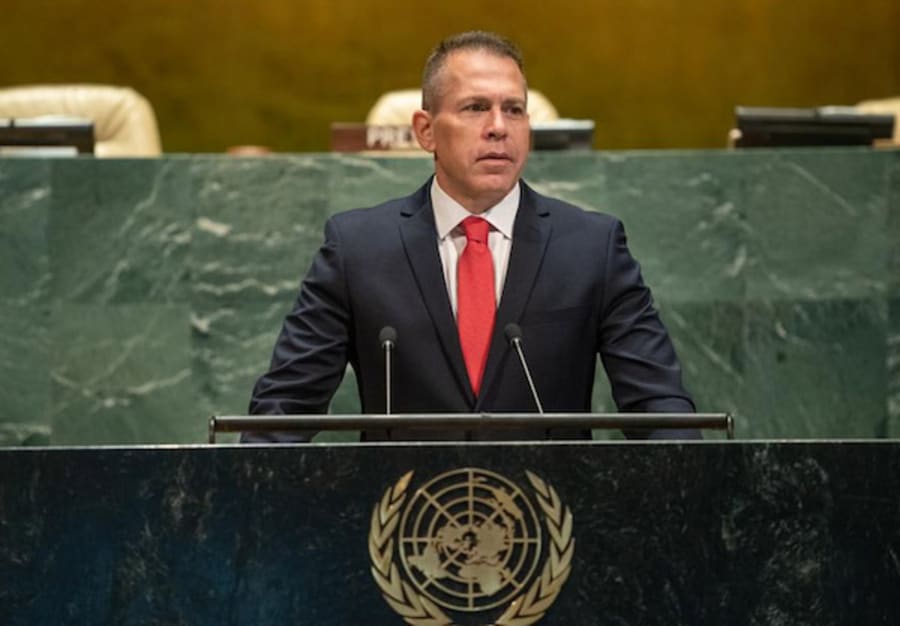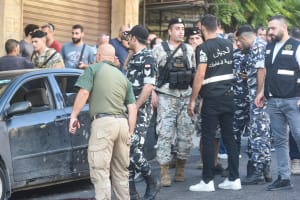Israel’s UN Ambassador Erdan blasts Lebanon for releasing Hezbollah terrorists who fired at Israel
Operatives fired off rockets – and were caught with more – inside civilian areas jeopardizing local citizens in Lebanon as well as Israel

Israeli Ambassador to the United Nations Gilad Erdan fired off a letter to the secretary general of the United Nations saying that rockets fired from civilian areas in Lebanon at Israel earlier this month constituted a flagrant violation under international law.
Erdan was protesting Lebanon’s decision to release four Hezbollah operatives who are responsible for firing 19 rockets at northern Israel two weeks ago. This was a rare time, since the Second Lebanon War in 2006, that Hezbollah – the powerful Shiite terrorist organization – took credit for firing rockets at the Jewish state.
“As you recall, on August 6th, Hezbollah fired from within civilian areas a barrage of 19 rockets into northern Israel,” Erdan wrote in his letter to António Guterres. “This attack came only two days after the terrorist organization had fired three rockets at Israel. Following the attacks, the four Hezbollah terrorists responsible for firing the missiles were apprehended in an adjacent village and handed over to Lebanese authorities.”
“It should be noted that they were found carrying 12 additional rockets that had yet to be fired,” Erdan continued. “Astonishingly, however, all four of these terrorists – who had violated Israeli sovereignty and targeted Israeli civilians, in brazen violation of UNSCR 1701 and international law – were released on the instruction of the Lebanese Deputy Attorney General within 24 hours of being detained.”
The Israeli ambassador emphasized that the release of the Hezbollah terrorists was directly linked to the considerable influence of the Iranian regime and its terrorist proxy in Lebanon.
“The release of the four terrorists clearly smacks of politics, and underlines the extent of Iran’s and its proxy, Hezbollah’s, domination of local government and power in Lebanon. Moreover, such an act of impunity serves only to encourage further attacks on Israel, severely endangering regional stability and civilians on both sides of the Blue Line. In this context, it is important to recall that these types of attacks – perpetrated from within populated areas using local Lebanese residents as human shields – imperil not only Israel and Israelis, but Lebanese civilians as well.”
Erdan urged the UN Security Council to condemn the Lebanese government for failing to prevent rockets being fired from its territory toward the Jewish state.
“I call upon the Security Council once again to condemn these grave violations unequivocally, and to denounce in no uncertain terms the Lebanese Government’s lack of action in this matter, in violation of its international obligations and in complicity with Iran and Hezbollah. Furthermore, I ask that the Security Council remain seized of these matters in its upcoming deliberations on Security Council Resolution 1701. It is paramount for the security of the region that the Security Council address in a meaningful way how to ensure the effective enforcement of UNSCR 1701 on the ground, and prevent Iranian and Hezbollah hegemony in southern Lebanon. Moreover, it is imperative that the latest attacks and the Lebanese Government’s utter failure to prevent them -- not to mention Lebanon’s subsequent failure to take concrete action against the perpetrators -- be faithfully reflected in the Secretary-General’s reports on the implementation of Resolution 1701,” stated the Israeli ambassador.
Since the Second Lebanon War, the border between Israel and Lebanon has been far more quiet than the fragile and chronically tense border between Israel and the Gaza Strip. However, as Lebanon rapidly crumbles into a failed state, Hezbollah has been emboldened and was likely testing the new Israeli government’s response with its latest rocket fire.
Hezbollah is a far more formidable foe than Hamas. It was recently reported that Hezbollah has built with North Korean assistance a vast interregional tunnel network that stretches for hundreds of kilometers, much larger than Hamas’ “metro” network in Gaza. Hezbollah’s network includes tunnels that stretch into Israeli territory.
In addition, Hezbollah is believed to possess around 150,000 rockets, one of the largest rocket arsenals in the world. During the recent Gaza war, Hamas fired more than 4,000 rockets at Israel during 11 days of fighting. By contrast, Israeli military officials recently estimated that in a future war with Hezbollah, the Lebanese-based Iranian terrorist proxy would be capable of firing up to 3,000 rockets per day for at a week at the Jewish state.
In other words, Hezbollah is Hamas on steroids.

The All Israel News Staff is a team of journalists in Israel.














